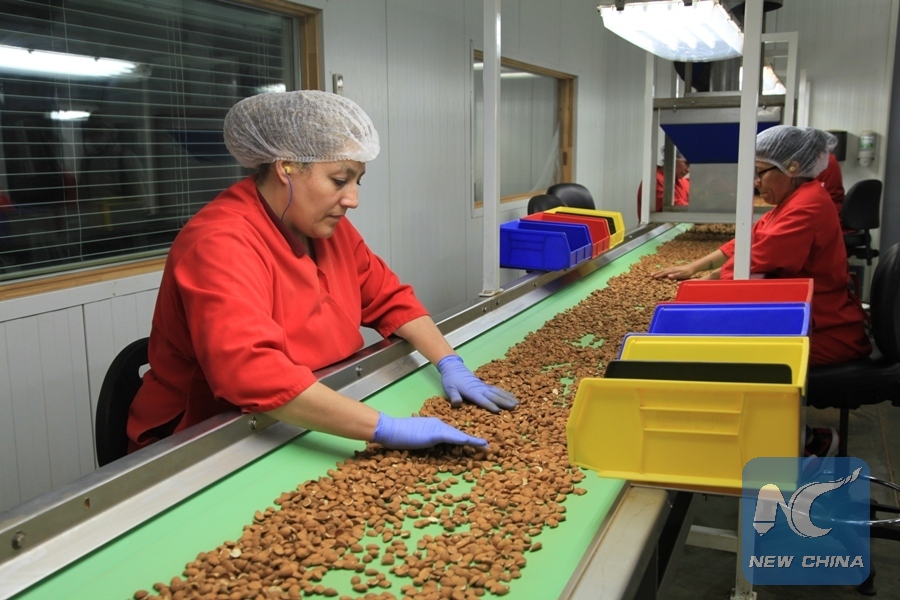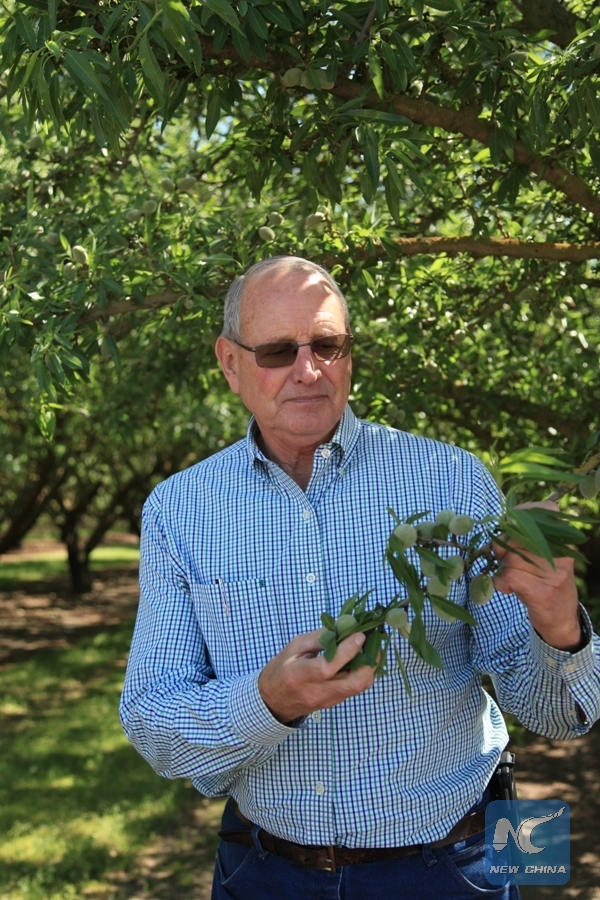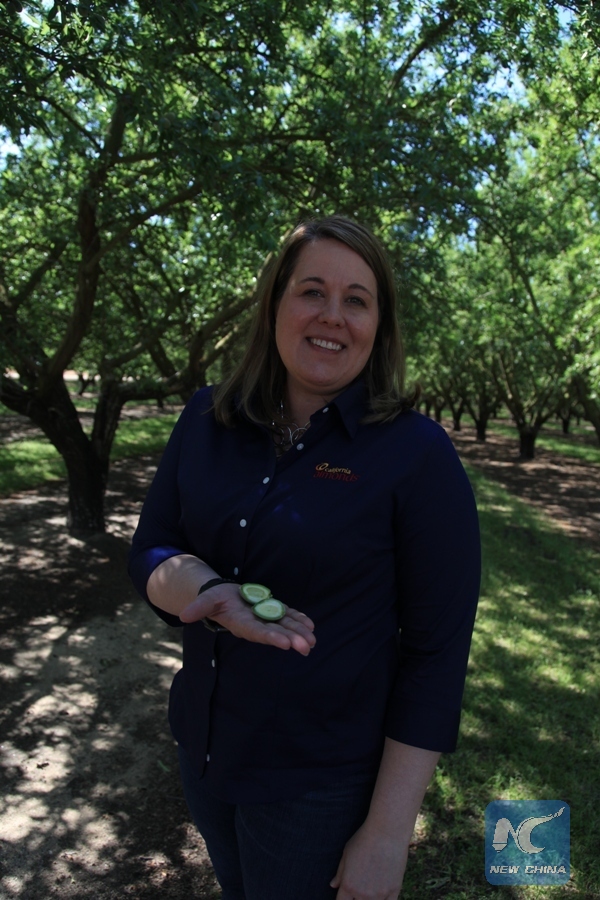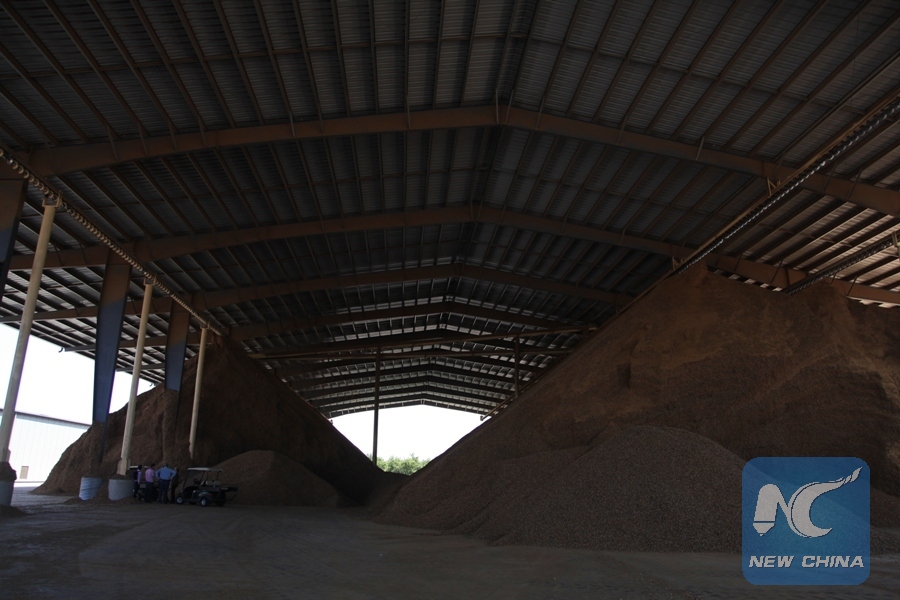
Workers are processing almonds at a processing plant of Travaille and Phippen, Inc., an almond growing and processing enterprise, in Modesto, the United States, on April 25, 2018. (Xinhua/Gao Shan)
by Julia Pierrepont III, Gao Shan
MODESTO, the United States, April 26 (Xinhua) -- It's verdant almond groves for as far as the eye can see.
In California's beautiful San Joaqiun Valley, rank-upon-rank of hearty young nut trees, laden with ripening, green-hulled almonds, basking in the California sun, cover thousands of acres of fertile heartland.
Weddings and picnics may take place beneath their tranquil, leafy canopies, but make no mistake, this is business - very big business.

Photo taken on April 25, 2018 shows Californian almond grower Dave Phippen in Modesto, the United States. California's almond growers urge the United States and China to move forward to reach trade reconciliation. (Xinhua/Gao Shan)
This delicious nutmeat, nurtured within a fuzzy outer shell, has spawned an industry with a value of 4.5 billion U.S. dollars in foreign sales and employs more than 100,000 people, accounted for nearly 25 percent of California farm exports in 2016.
Travaille and Phippen, an almond growing and processing enterprise co-owned by "the five families," a collection of siblings and cousins, have 1,600 acres under cultivation and are still optimistic about the future of farming. They use specialized irrigation systems to reduce water usage, advanced soil testing techniques, and even high tech drones to aerially survey their acreage, all in efforts to optimize their harvest yields.

Photo taken on April 25, 2018 shows Emily Fleischmann, Senior Director of Global Marketing for the California Almond Board, in Modesto, the United States. (Xinhua/Gao Shan)
A 4th generation farming family, they're close to hitting the coveted 100-year recognition threshold given to the most-honored founding farm families in the region.
The family enterprise was founded by their grandfather from the Netherlands who had the foresight to gift each of his 9 children with 40 acres each (minus the mule), which his descendants have, through hard work and dogged determination, managed to increase to 1,600 acres today.
When asked about the crop of younger generations following in their footsteps, co-owner, Dave Phippen, quipped, "They're going to need more dirt."
California's vast San Joaquin Valley, known as the breadbasket of America (and many points beyond) is one of the most productive agricultural regions in the world. Farming, though an ancient and noble profession that is literally responsible for the rise of civilization as we know it, is facing serious challenges in California.

Photo taken on April 25, 2018 shows the processing plant of Travaille and Phippen, Inc., an almond growing and processing enterprise, in Modesto, the United States. (Xinhua/Gao Shan)
Between regulatory quagmires and persistent 6-year drought that the journal of Geophysical Research Letters cited as the driest in over 1,000 years, California growers are now facing an other potentially debilitating challenge: The U.S.-China trade war.
During an exclusive interview with Xinhua on Wednesday, when asked what impact the trade war might have on his family's firm, Phippen responded, "No shipments to China have been cancelled yet, but, the new crop will be coming in August and if this disagreement isn't settled by then, it will have more impact on the new crop."
He added, "The 15 percent tariff the Chinese are talking about levying on top of the 10 percent tariff we already pay would have a significant impact on our business."
As the scion of a well-respected farming family that relies on a global marketplace, Phippen takes trade seriously.
"Any impediment to trade is a challenge for a Californian almond grower and something we're worried about. If a larger percentage of our product was consumed in North America, we'd probably be less concerned, but China is already our third biggest market." China buys roughly a third of their harvest each year.
California almond growers are a feisty lot who aren't afraid to get down in the dirt and duke it out. They pull no punches where their economic interests are concerned, "Any impact on foreign trade with any country is a concern to us," Phippen made plain.
"The people who represent us in Washington have heard from us," he grinned. "They are well aware of their California constituents, well aware California is an exporting state, well aware that almonds are NO. 1."
California grows 80 percent of the almonds consumed by not just Californians, not just by Americans, but by the entire world. It's a mega industry.
There is no doubt there's a lot at stake. Including direct, indirect, and induced economic output, the total economic impact of the almond industry on California output is about 21.5 billion dollars. Of that 21.5 billion, about 11 billion is value added to the California state economy.
Of that 11 billion dollars, about 7.6 billion dollars comes directly from almond farming. The remaining 3.4 billion dollars is derived from the almond manufacturing and processing sectors.
"We've been in China for nearly 20 years and we've spent almost 70 million dollars (in marketing). Not a small investment," explained Emily Fleischmann, Senior Director of Global Marketing for the powerful California Almond Board. "And we've seen years of steady growth."
She discussed the Almond Board's mission to spread the news in China about their nuts versatility, as well as its nutritional and health benefits.
"We market to Chinese consumers in the 1st and 2nd tier cities, especially during the Spring Festival, with promotions that say, "Go home. Feel good." We focus on professional young women, especially around beauty, with ads like "Bring inside beauty outside."
After posting continuous year-over-year sales gains in China as their harvest yields continue to increase, Phippen told Xinhua, "We look at China as our big opportunity and it hasn't disappointed us so far."
Like an elder statesman, he cautions a less heated, wait-and-see attitude, "We would all be remiss to think these tariffs are permanent. American and China are important trading partners, not just for almonds - for all of our industries. Look at where we were many years ago versus where we are today. I don't think anyone in business wants to go back to where we were."
And he has high hopes everyone will see reason. In fact his best case scenario for the trade dispute resolution is, "A zero trade tariff. That should be the goal that both China and the U.S. - and CA in particular - are after."
When asked if situation might get worse rather than better, he was quick to contradict the notion, "I don't expect that. This is just a 'dust up.' (The U.S. and China) recognize each other as important global traders and we are going to respect that."
"In the end, it's important for both the American and the Chinese companies that we settle this dispute," he pointed out.
Looking at it from the Chinese point of view, he added, "And I don't think we want the Chinese consumer to ever be denied this safe, tasty product - a nutrient-rich one for every person in China who wants to avail themselves of it.
"How would countries serve their people well if they increased the tariffs to such high levels that it strangled trade?" he asked rhetorically. "I don't see it going there, because I think the people that lead us both here and in China, are smarter than that."
"If you have a disagreement with someone you care about, you go there. You share your concerns and you listen to theirs," Phippen stressed.

